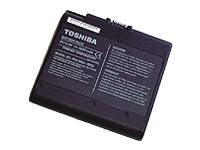 Toshiba has developed a super-fast Lithium-Ion battery capable of being charged to 80 per cent of its full capacity in under 60 seconds. According to the company, a full charge takes just “a few more minutes”.
Toshiba has developed a super-fast Lithium-Ion battery capable of being charged to 80 per cent of its full capacity in under 60 seconds. According to the company, a full charge takes just “a few more minutes”.
Toshiba prototype ‘one-minute charge’ Li-ion battery can be recharged about 60 times faster than conventional lithium ion batteries, with the company claiming that the technology could be commercialised for portable electronics products in about three years.
Toshiba has developed two prototype batteries, with the smaller prototype (measuring 3.8mm by 62mm by 35mm) retaining 99 percent of its capacity after being charged 1,000 times, and the company are claiming that their fast-charging batteries will have about the same life as conventional rivals.
The company has been shouting about the new battery’s eco-credentials, pointing out that the fast recharging time will consume less energy than today’s Li-ion cells, leading to reduced carbon-dioxide emissions.
And, as they say on shampoo adverts, here’s the science: Toshiba clever technology uses “nano-particles” to “prevent organic liquid electrolytes from reducing during battery recharging. The nano-particles quickly absorb and store vast amount of lithium ions, without causing any deterioration in the electrode”.
So, err, now you know.
Toshiba’s ‘miracle’ battery will come to market next year, the company said, initially in automotive and industrial applications.
Toshiba announce Billy Whizz memory chip
Meanwhile, those crazy speed freaks at Toshiba have been busy making the earth go faster with an announcement that they have been sampling computer memory chips with the “world’s fastest data rate.”
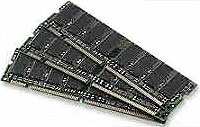 The 512Mb XDR (extreme data rate) DRAM chips run at a turbo-charged speed of 4.8GHz, which is about 12 times faster than that of the memory typically found in today’s desktop PCs.
The 512Mb XDR (extreme data rate) DRAM chips run at a turbo-charged speed of 4.8GHz, which is about 12 times faster than that of the memory typically found in today’s desktop PCs.
DRAM is the main type of memory used in PCs and servers. The faster the memory, the more smoothly computers tend to work with the increased speed offering better graphics and gaming performance.
Working at the 4.8GHz speed, the chips deliver a bandwidth of 12.8GBps, making them suitable for use in high-end digital TVs and PC graphics applications.
If more voltage is used, the chips can work at a peak operating speed of 6.4GHz, according to Toshiba.
XDR memory technology was developed by U.S.-based Rambus, with the chips incorporating Rambus’s ODR (octal data rate) signalling, which can transfer eight bits of data per clock cycle, according to Toshiba.
South Korea’s Samsung Electronics and Japan’s Elpida Memory have also licensed XDR technologies from Rambus, and both chip companies plan to go into mass production of 512Mb XDR chips in the second half of 2005.
Toshiba made it past the post first, with Kim Soo-Kyoum, program director for semiconductor research at market research company IDC commenting, “Yes, it looks like Toshiba’s is the first … and yes, it’s the fastest … but Samsung and Elpida have similar schedules.”
Adoption of XDR as a main memory in high-end computing will start during 2007, according to a December 2004 report by IDC.
 In a shocking example of virtual life crashing into real life, a Shanghai online game player stabbed his gaming pal in the chest multiple times after he learned that he had stolen approximately US$870 (£462/€671) from the sale of a powerful “dragon sabre”, jointly owned by both players.
In a shocking example of virtual life crashing into real life, a Shanghai online game player stabbed his gaming pal in the chest multiple times after he learned that he had stolen approximately US$870 (£462/€671) from the sale of a powerful “dragon sabre”, jointly owned by both players.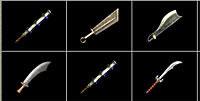 Still fuming, Chengwei popped around to have a word with Caoyuan who didn’t convince with his promises to pay him for the sword.
Still fuming, Chengwei popped around to have a word with Caoyuan who didn’t convince with his promises to pay him for the sword. However, online game companies in Shanghai – the city with the most players – are planning to set up a dispute system where aggrieved players can find recourse.
However, online game companies in Shanghai – the city with the most players – are planning to set up a dispute system where aggrieved players can find recourse. Microsoft has launched MSN Video Downloads, a spanking new mobile service that will provide daily television programming for downloading to Windows Mobile devices, such as Portable Media Centers, Smartphones and Pocket PCs.
Microsoft has launched MSN Video Downloads, a spanking new mobile service that will provide daily television programming for downloading to Windows Mobile devices, such as Portable Media Centers, Smartphones and Pocket PCs. The video content is compliant with ‘PlaysForSure’ video devices, and is optimised for Portable Media Centers and compatible with Smartphones and Pocket PCs that support Windows Media Player 10 Mobile.
The video content is compliant with ‘PlaysForSure’ video devices, and is optimised for Portable Media Centers and compatible with Smartphones and Pocket PCs that support Windows Media Player 10 Mobile. “With content from some of the most recognized brands in entertainment, MSN Video Downloads helps bring this vision to life, allowing people to take their favourite television shows with them whether they are on the train, waiting for a doctor’s appointment, or keeping the kids occupied in the back seat of the car.”
“With content from some of the most recognized brands in entertainment, MSN Video Downloads helps bring this vision to life, allowing people to take their favourite television shows with them whether they are on the train, waiting for a doctor’s appointment, or keeping the kids occupied in the back seat of the car.” All music videos on the site will be made available in multiple formats for playing on traditional PCs, laptops and Microsoft’s Windows Mobile-based secure devices including the Portable Media Centers, Pocket PCs and select Smartphones.
All music videos on the site will be made available in multiple formats for playing on traditional PCs, laptops and Microsoft’s Windows Mobile-based secure devices including the Portable Media Centers, Pocket PCs and select Smartphones.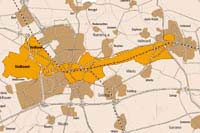 Last week, deputy Director-General Mr Broesterhuizen of the Dutch ministry of Economic Affairs officially opened the Netherland’s largest Fiber-to-the-Home (FttH) network in Nuenen, a village in the south of The Netherlands.
Last week, deputy Director-General Mr Broesterhuizen of the Dutch ministry of Economic Affairs officially opened the Netherland’s largest Fiber-to-the-Home (FttH) network in Nuenen, a village in the south of The Netherlands.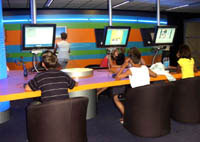 By summer 2005, approximately 16,000 FttH connections will be up and running in the Kenniswijk area, with over “100 innovative services” being developed, of which 50 are already available.
By summer 2005, approximately 16,000 FttH connections will be up and running in the Kenniswijk area, with over “100 innovative services” being developed, of which 50 are already available. As of early May, Dutch Vodafone customers will be able to say ‘nr!’ to saucy adult content offered via Vodafone live! from their mobile phone.
As of early May, Dutch Vodafone customers will be able to say ‘nr!’ to saucy adult content offered via Vodafone live! from their mobile phone.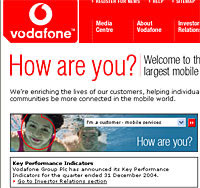 With hand-rubbing porn-shifters keenly eying up a growing – and lucrative – mobile multimedia market, it makes sense for telcos to be able to reassure parents that young Timmy’s new handset isn’t going to become a mobile gateway into the portals of smut.
With hand-rubbing porn-shifters keenly eying up a growing – and lucrative – mobile multimedia market, it makes sense for telcos to be able to reassure parents that young Timmy’s new handset isn’t going to become a mobile gateway into the portals of smut. Memory card kings Lexar Media have teamed up with videogame big boys, Ubisoft, in a cunning piece of cross-market publicity.
Memory card kings Lexar Media have teamed up with videogame big boys, Ubisoft, in a cunning piece of cross-market publicity.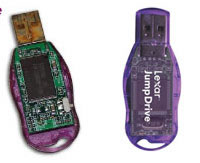 Described as a “major value-add promotion” it looks more like the unexciting equivalent of a magazine freebie cover disk to us, but Theresa Boldrini, Lexar Director of Retail Marketing, can’t hold back her excitement:
Described as a “major value-add promotion” it looks more like the unexciting equivalent of a magazine freebie cover disk to us, but Theresa Boldrini, Lexar Director of Retail Marketing, can’t hold back her excitement: And if all that wasn’t enough, a special Lexar promotion will offer consumers a free Tom Clancy’s Splinter Cell Chaos Theory t-shirt with the purchase of another Lexar product (be still my bearing heart!).
And if all that wasn’t enough, a special Lexar promotion will offer consumers a free Tom Clancy’s Splinter Cell Chaos Theory t-shirt with the purchase of another Lexar product (be still my bearing heart!). History will be made in a small corner of Wales today when the residents of two Carmarthenshire villages – situated on either side of the River Tywi – switch to digital-only TV.
History will be made in a small corner of Wales today when the residents of two Carmarthenshire villages – situated on either side of the River Tywi – switch to digital-only TV. To help smooth the transition, a helpline was set up for residents’ teething problems, with one-to-one support made available to the elderly.
To help smooth the transition, a helpline was set up for residents’ teething problems, with one-to-one support made available to the elderly. There are concerns, however, that these fancy-pants new digi-boxes could be a problem for the elderly and those on poor incomes. The government is discussing with charities about how to protect the vulnerable while promising not to authorise a complete switchover until support measures are in place.
There are concerns, however, that these fancy-pants new digi-boxes could be a problem for the elderly and those on poor incomes. The government is discussing with charities about how to protect the vulnerable while promising not to authorise a complete switchover until support measures are in place.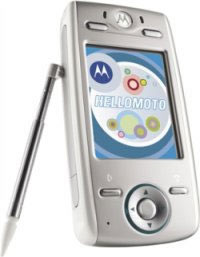 After the humiliating no-show of their much hyped (and currently in-limbo) iTunes phone at CeBIT earlier this month, Motorola have hit back with two new music phones.
After the humiliating no-show of their much hyped (and currently in-limbo) iTunes phone at CeBIT earlier this month, Motorola have hit back with two new music phones.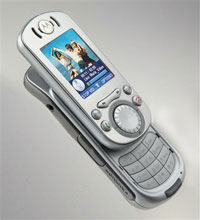 Sporting a ‘slider’ form factor, the E725 is a music player-cum-smartphone featuring a 1.9″ display (176 x 220 pixels resolution) with dedicated music keys, 5-band graphic equaliser and dual stereo speakers with virtual surround sound.
Sporting a ‘slider’ form factor, the E725 is a music player-cum-smartphone featuring a 1.9″ display (176 x 220 pixels resolution) with dedicated music keys, 5-band graphic equaliser and dual stereo speakers with virtual surround sound. Research carried out on by Infosecurity Europe has revealed that 92% of people were willing to freely dish out all the personal information needed to steal their identity in exchange for the chance to win a theatre ticket.
Research carried out on by Infosecurity Europe has revealed that 92% of people were willing to freely dish out all the personal information needed to steal their identity in exchange for the chance to win a theatre ticket. When they were told that it was a combination of their pets name and mothers maiden name, they were asked what they thought their stage name would be. Like a bunch of chumps, ninety four percent (94%) of respondees then blabbered out their mother’s maiden name and pet’s name.
When they were told that it was a combination of their pets name and mothers maiden name, they were asked what they thought their stage name would be. Like a bunch of chumps, ninety four percent (94%) of respondees then blabbered out their mother’s maiden name and pet’s name. Incredibly, the researchers did not give any verification of their identity, offering only a trusty clipboard and the offer of the chance to win a voucher for theatre tickets.
Incredibly, the researchers did not give any verification of their identity, offering only a trusty clipboard and the offer of the chance to win a voucher for theatre tickets. A British company has unveiled its cunning plan to roll out high-speed wireless networks and location-based services using street lampposts.
A British company has unveiled its cunning plan to roll out high-speed wireless networks and location-based services using street lampposts. Shrier believes that revenue could be generated by persuading companies to store their information on lampposts, paying Last Mile whenever someone accesses data using the MagicBook.
Shrier believes that revenue could be generated by persuading companies to store their information on lampposts, paying Last Mile whenever someone accesses data using the MagicBook.